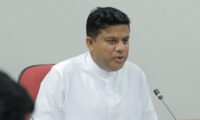Sri Lanka’s debt-ridden state power utility, the Ceylon Electricity Board (CEB), has requested a 6.8% electricity tariff increase for the final quarter of 2025, as it struggles with soaring costs, mounting debt, and outdated infrastructure.
In a detailed submission to the Public Utilities Commission, the CEB cited rising energy and financing costs, Mahinda Rajapaksa-era debt tied to the long-delayed Uma Oya hydro project, and a widening deficit expected to reach Rs 7.7 billion between October and December.
If approved, this would mark the third tariff revision this year, affecting over 7.2 million electricity consumers.
The CEB’s revenue forecast for the quarter stands at Rs 112.37 billion, against projected costs of Rs 125.3 billion — driven by an estimated Rs 68.46 billion in energy costs alone.
Capacity costs are projected at Rs 20.23 billion, partly inflated by delay penalties and repayment obligations related to the Uma Oya project, originally funded by an Iranian loan during the Rajapaksa administration.
Financing costs have surged significantly, with Rs 4.3 billion in capital repayments and Rs 1.7 billion in interest payments, pushing the total to Rs 7.83 billion, up nearly Rs 2.5 billion from earlier forecasts.
Notably, 70% of a Rs 20 billion debenture issued in 2021 was used to settle payments to private power producers and the Ceylon Petroleum Corporation.
The CEB has already reported a group loss of Rs 9.5 billion for the first half of 2025, according to unaudited financials filed with the Colombo Stock Exchange.
Revenue fell 38% year-on-year to Rs 201.5 billion, despite a fall in finance costs due to lower interest rates.
Analysts have pointed to serious issues in the utility’s financial governance. The CEB’s forecasts for energy generation, finance costs, and revenue continue to deviate sharply from earlier projections, with little explanation beyond a vague reference to “a significant increase in all major cost items.”
Despite directives, the CEB has yet to finalise fuel supply agreements for key power plants and has not corrected errors in previous transmission revenue estimates.
Meanwhile, internal restructuring plans have been floated, and trade unions are already agitating over the proposed overhaul, underscoring the growing pressure on the state utility to reform while balancing public backlash against further rate hikes.











Leave a comment